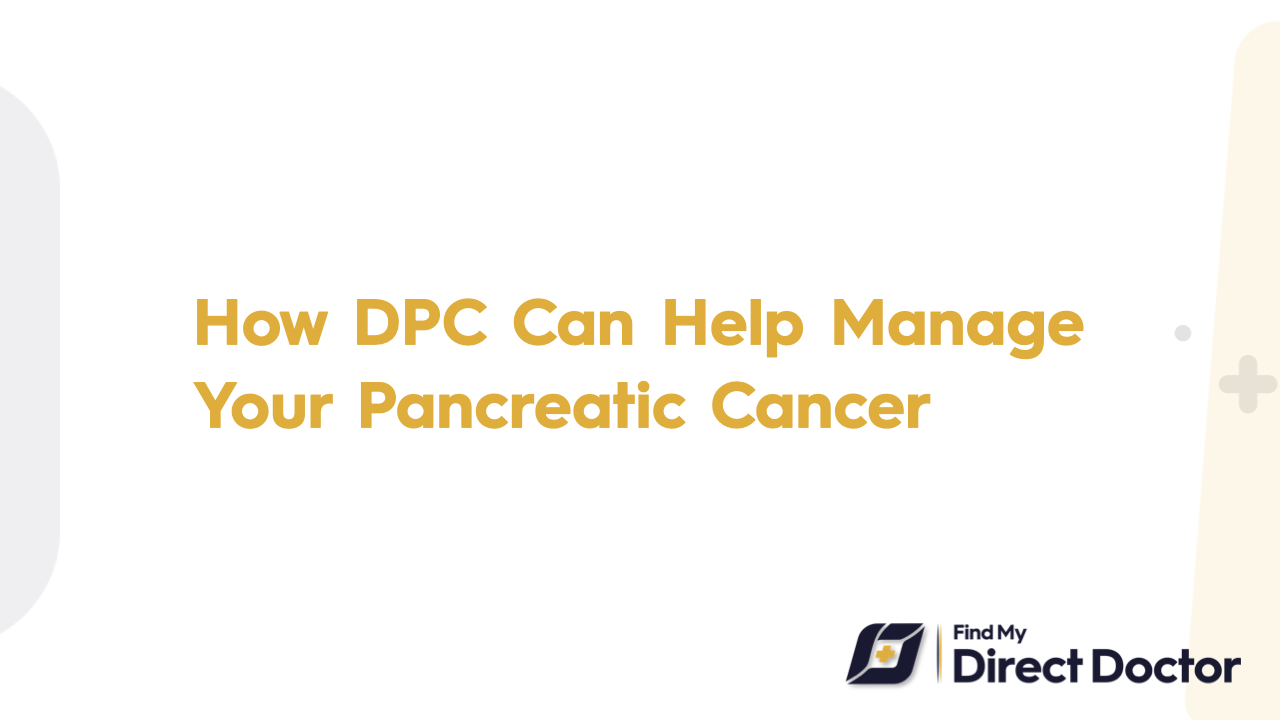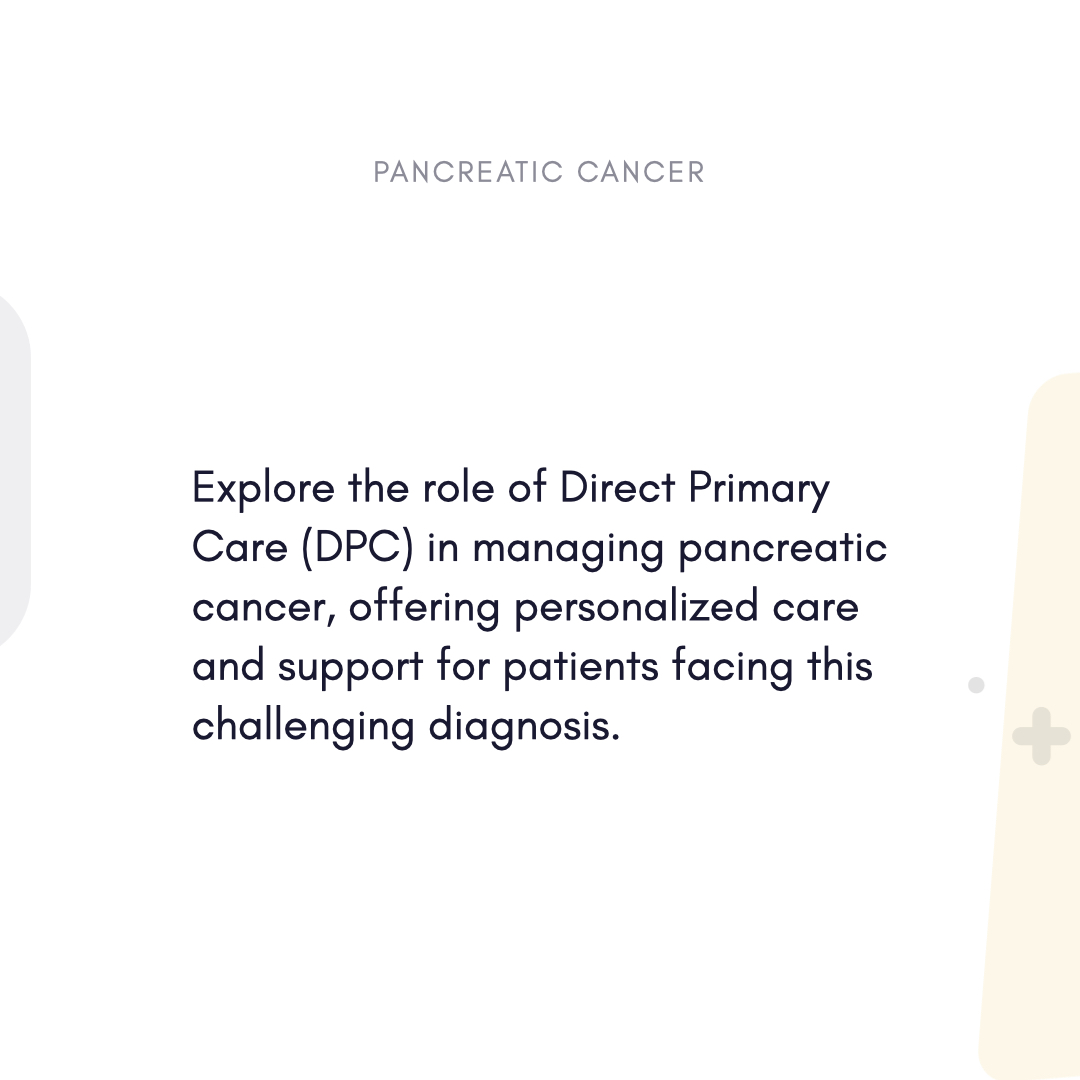Pancreatic Cancer and Direct Primary Care (DPC): Personalized, Proactive Care for Complex Battles
A diagnosis meant to stop you cold. Pancreatic cancer requires fast, precise treatment with its dismal 5-year survival rate of 12%. Still, conventional treatment sometimes drowns patients in disorganized communication, insurance delays, and specialist referrals. There is hope, though: Direct Primary Care (DPC) provides a lifeline—fast access, tailored plans, and relentless advocacy mixed to negotiate this complicated disease.

Learning About Pancreatic Cancer
Usually hiding before symptoms appear, pancreatic cancer begins in the pancreatic ducts. Major challenges include:
- Latent diagnosis: Eighty percent of all the cases are found in Stage IV.
- Sharp character: quickly reaches kidneys, lungs, or bones.
- The complexity of treatment is Radiation, surgery, chemotherapy—including FOL FIRINOX—call for precise coordination.
Look for this kind of symptoms:
- Jaundice, or yellowing eyes or skin,
- Unexplained weight loss or appetite reduction
- Upper abdomen pain radiating back from
- Blood clots or new onset diabetes
Early intervention and continuous care are absolutely vital for improving outcomes, says the American Society of Clinical Oncology (ASCO).
DPC Changing Behavior Managing Pancreatic Cancer
Usually 75–200 USD/month, Direct Primary Care (DPC) offers your doctor flat fee access based on a membership model. This translates for those with pancreatic cancer into no prior authorizations, unexpected bills, and a team dedicated to your fight.
1. Early Intervention and Accelerated Diagnostics
The easily available DPC model aids in same-day pain or jaundice evaluations that cause questions.
- Imaging with reasonable costs: Negotiated MRIs, CT scan cash rates, endoscopic ultrasolds (EUS).
- National Comprehensive Cancer Network (NCCN) guidelines for hereditary syndromes (e.g., BRCA, Lynch) call for genetic testing.
2. Coordinated, Patient-Centered Treatment Based on Common Sense
- Working with oncologists, DPC doctors customize treatment plans to balance chemotherapy efficacy with quality-of-life concerns.
- Control adverse effects: Designed specifically for neuropathy, nausea, or tiredness.
- Incorporate palliative care by early referrals for pain management and emotional support.
3. Both Financial and Emotional Support
- DPC reduces costs by cutting labs and wholesale-priced medications like Creon for pancreatic insufficiency.
- 24-hour accessibility: For chemo flares or infections, fast direction helps to stop ER trips.
- Resources about mental health: Therapy for anxiety, depression, or caregiver stress.
DPC Benefits for Cancer Patients Including Pancreatic Cancer
- Customized, Guideline-Based Treatment Plans aligned with ASCO: Nutritional support; regular CA 19-9 monitoring; advance care planning.
- Extended visits to weigh Whipple surgery risks, clinical trials, or hospice options lead to shared decisions.
2. Unequal Access to It
- Direct specialist coordination: rapid referrals to top surgeons or radiologists.
- There are no waiting times; biopsies booked in days instead of weeks.
Three: Open Cost Clearliness
- Typical savings: 5,000+ USD a year from avoiding imaging mark-ups, ER visits, and co-pay stacks.
- Membership includes care coordination, symptom control, and end-of-life planning.
Individual Stories of Personal Success from Actual Experience
- Case 1: James, 58, had months of nebulous stomach problems dismissed. She connected him with a surgeon 72 hours following his DPC doctor's prescription of a same-day CT scan and discovery of a resectable tumor. Whipple surgery has cleared him of cancer today.
- Case 2: After Stage IV pancreatic cancer, Linda, 65, suffered from terrible chemo side effects. Her DPC provider recommended medical cannabis, set up acupuncture for neuropathy, and watched over telehealth visits with her oncologist. Her living conditions improved greatly.
Question Frequency: DPC and Pancreatic Cancer
- Can DPC control cases of advanced pancreatic cancer?
- A: Exactly. Coordinating palliative care, pain management, and clinical trial referrals, DPC physicians ensure your comfort and dignity.
- Is DPC within the means for expensive operations?
- A: Is valid. Members save hundreds on imaging, medications, and ER avoidance—money better used for family needs or therapy.
- Q: Say I need a specialist not connected to the DPC network?
- A: Often getting 30–50% discounts, DPC doctors negotiate self-pay rates with top oncologists, surgeons, and radiologists.
Why DPC Provides Patients With Pancreatic Cancer With a Win
Emphasizing their alignment with ASCO and NCCN recommendations, the American Academy of Family Physicians supports DPC.
- Crucially important for a disease where delays kill people is speed.
- Precision: PARP inhibitors for BRCA+ patients among other treatments are based on biomarkers and genetic testing.
- Tools to track symptoms, advocate for your needs, and negotiate treatment options empower you.
Master Your Journey Through Pancreatic Cancer.
While pancreatic cancer is a formidable foe, you do not have to fight alone. Using DPC results in a healthcare friend who plans carefully, acts aggressively, and supports you—every stage of the process.






